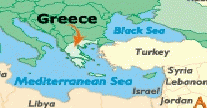So just who is this Syriza Party and what do they want? The group formed in 2004 as the Coalition of the Radical Left. At first, they were nothing more than a hodgepodge of 13 different leftist groups that sought to consolidate their efforts and become a much greater force in the country. Their core appeal was their complete opposition to the austerity measures. With every new restraint, with every mass layoff and with every cut salary and pension, Syriza grew stronger. It was always about when, not whether, they would become the majority party and now, that day has arrived.
In modern times the Greeks have been accused of being carefree and profligate, that is too dependent on reckless government spending. Yet recent studies show that Germany, Sweden and others European nations spend much more of their GDP on their citizens than Greece. In reality, Greece's public spending is only 44.6% of GDP, less than the EU average, less than Germany @ 46% and waaaayyy under Sweden's 55%. This just in, Sweden's economy fared very well after the Great Recession. I think we all know how Germany has fared. Last year was a record exporting year for Germany. Public spending has little or nothing to do with Greece's current crisis.
The Greeks are called lazy, yet, according to the OCED, they work more hours throughout the year than all but a handful of countries. And contrary to popular belief, the Euro bailout has not helped the average Greek citizen at all. Most of that money goes right back to the insolvent banks that issued it in the first place in order to "cover Greece's outstanding debt."
So how did Greece get in the EU in the first place? According to the Maastricht Treaty, the standards with which all potential entrants into the EU must comply, a country must first demonstrate that its budget deficit to GDP ratio is 3% or less. Greece failed on their first attempt in 1999 and again in 2000. But in 2001, Goldman Sachs entered the picture and, with the help of currency swap derivatives, effectively masked much of Greece's deficit and voila, instant 3%. For the paltry sum of six hundred million dollars, Goldman Sachs made a sweetheart deal with Greece to mask much of their deficit with a loan that even had teaser rates built right in. This helped Greece mask its true deficit ratio for over five years. The Greek population had absolutely nothing to do with this.
Another part of the Maastricht Treaty that must be followed is a debt to GDP ratio of no more than 60%. Though they were close in the beginning, that stickler proved to be even harder to match. After 2006 as shown by the Trading Economics chart it became impossible. It was already at 100% in 2006 and has been spiraling ever higher since then. The Greek government knew the day would come when they were no longer able to hide their real books from the EU auditors. They kept putting off the unavoidable until it was too late.
As far as the citizenry never paying taxes, this is a total lie. All workers must pay payroll tax. These taxes are taken directly from each worker by their employer every pay period, exactly like the US. It's not the worker bees who don't pay taxes, it's the rich who never pay their share. This from a BBC emission on the Greek Crisis in June, 2011, where Jerome Roos explains the problem: "Tax collection: the real problem is not social expenditure on the poor but the lack of tax collection from the rich. From 2001 to 2007, Greece collected only an average of 39.4% of GDP in taxes, compared to the EU 44.4% average." The rich are among the ones pushing the nation to austerity measures. Measures they know full well won't affect them at all.
Goldman Sachs, along with a number of other Wall Street Banks, has been "helping" Greece since the first part of the new century. What was 2.8 billion euros of loans when Greece had entered the EU, exploded to 5.1 billion euros by 2005. Even military spending increased. According to a report by BICC, Bonn International Center for Conversion (BICC) GmbH, Greeks still had a higher percentage of their budget dedicated to their military than any other European nation. They stated, "Eight years [after 2000] this figure had risen to 8.620 billion euros." The Greeks didn't need more weapons, nor further debt. The banks that are so concerned now about Greece's budget was more than happy to sell them the kiss of debt before.
And then came the Great Recession of 2008.
International lending instantly dried up. The bank Northern Rock had just failed. The 80-year old financial pillar Bear Sterns became insolvent. Lehman Brothers, with over $630 billion in assets, filed for bankruptcy. The contagion spread everywhere including Greece. The effect was disastrous. Greek unemployment skyrocketed from under 10% in 2008 to a whopping 25% in 2014. According to the Greek English newspaper, EnetEnglish, "[The] percentage [of poor people] has risen steadily since 2010, when the country began implementing austerity measures, increasing from 27.6% in 2010 to 34.6% in 2013."
By October, 2009, Greece's deficit to GDP ratio had zoomed to 12.5%, way, way above the 3% allowed by the EU. At the end of 2009, all the major American rating agencies, Fitch, Moody's and Standard and Poor, had severely downgraded Greek bonds which meant that in 2010 all of the loans that Greece will need to help grow the economy were going to cost a whole lot more. These agencies are the same ones who gave Goldman Sachs, JP Morgan and other banks' hedge funds a top rating all the way up the complete collapse of the banking industry. Obviously, they know what they are talking about.
On February 9, 2010, the Greek parliament approved the first austerity measures that included a freeze on the salaries of all government employees, a 10% cut in bonuses, as well as cuts in overtime pay for workers. Less than a month later, that same parliament passed a second austerity plan which included pension freezes, an increase in sales tax from 19% to 21%, rises in taxes on fuel, cigarettes and alcohol, rises in taxes on luxury goods, and cuts in public sector pay. This was done PRIOR to any request by the Greek government for a bailout.
The Prime Minister of Greece at the time was George Papandreou, head of the Socialist Party. Yes, you read right. The head of the Socialist Party had sided with the capitalist countries and decided to punish the middle and poor classes for the sins of the rich and foreign banks. He only asked the EU for a bailout the following month, April.
Two weeks later, the EU/IMF agreed to a loan only if a third austerity program went into place. Another 8% reduction in salary for all public employees. More taxes for high pensions, company profits (knowing full well that the multinational corporations never pay taxes), imported cars, sales tax, and others is implemented. The retirement age is moved from 61 to 65. The number of publicly owned companies drops from 6,000 to 2,000. Remember, this was with a Socialist government and Socialist Prime Minister. The socialists opted for privatization!
Oh, and this just in. France and Germany DEMANDED that Greece's orders for more weapons of war be honored regardless of what happens, even though Greece has ZERO need for any of it. Billions of dollars that should have gone to the Greeks instead went to France and Germany. Guess where the money is coming from to honor those orders!
But Papandreou did promise an end to this horrific austerity. "The economy is projected to return to growth in 2012 and not 2011 as previously anticipated," he told everyone. After all, this was a loan sanctioned by the EU and the IMF and they obviously know what they're doing. Spoiler alert!! He lied.
(Note: You can view every article as one long page if you sign up as an Advocate Member, or higher).






